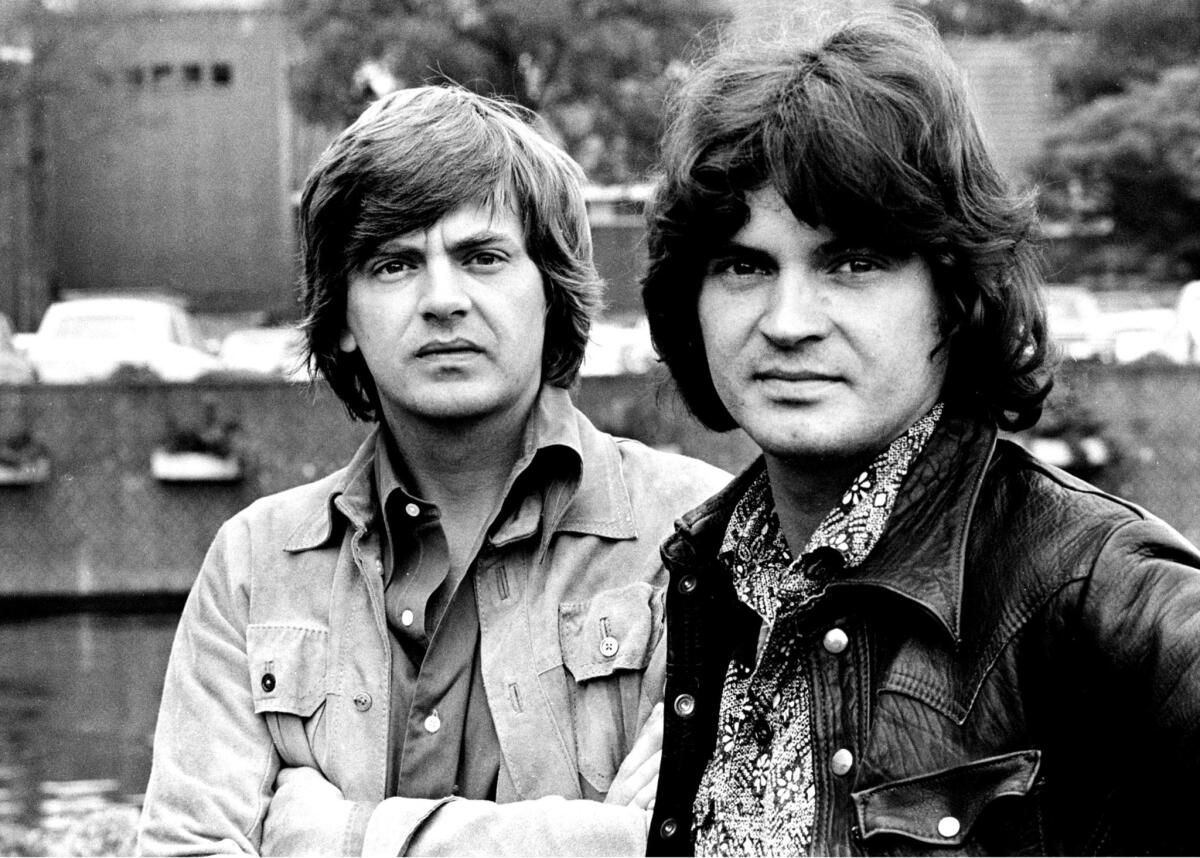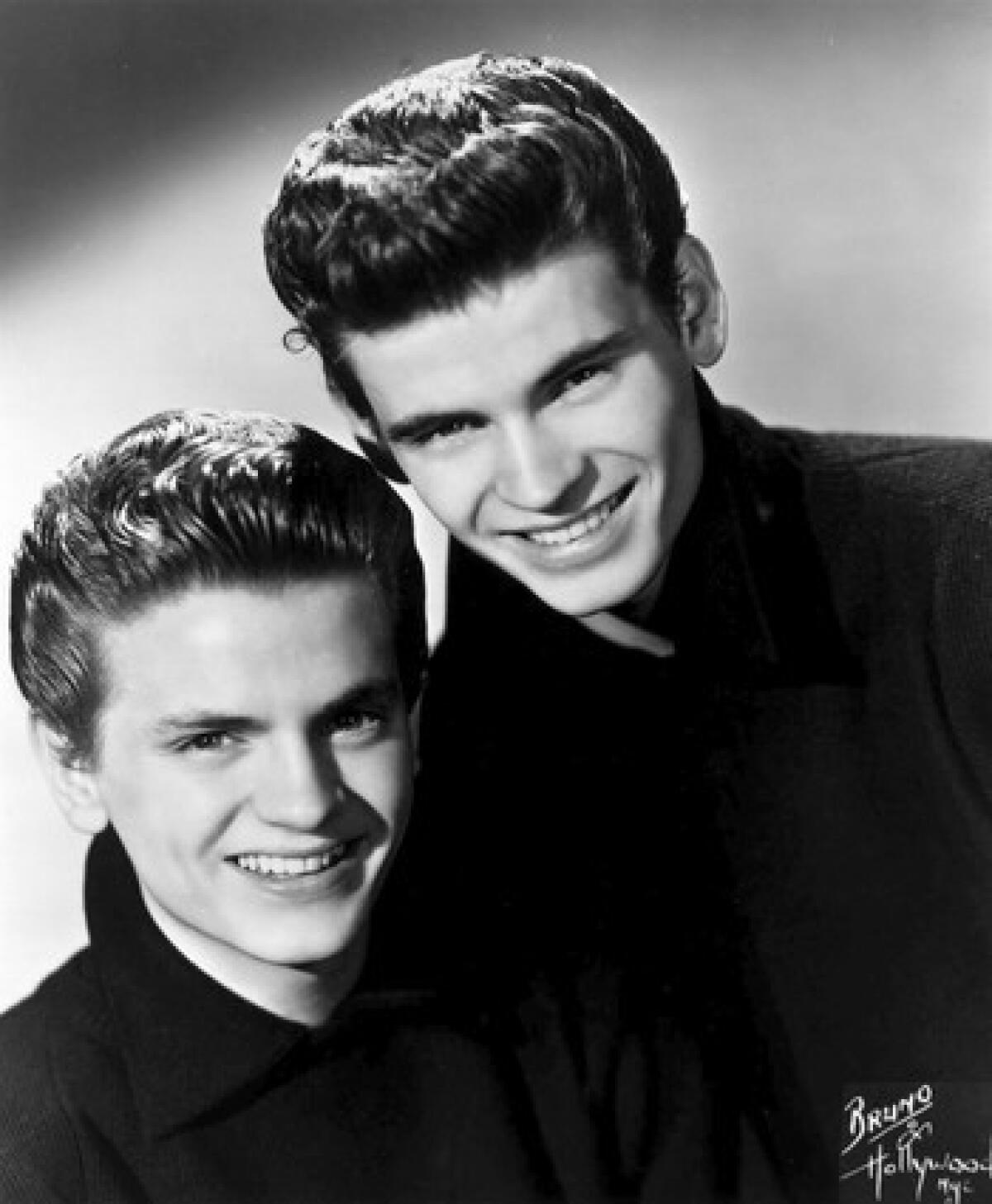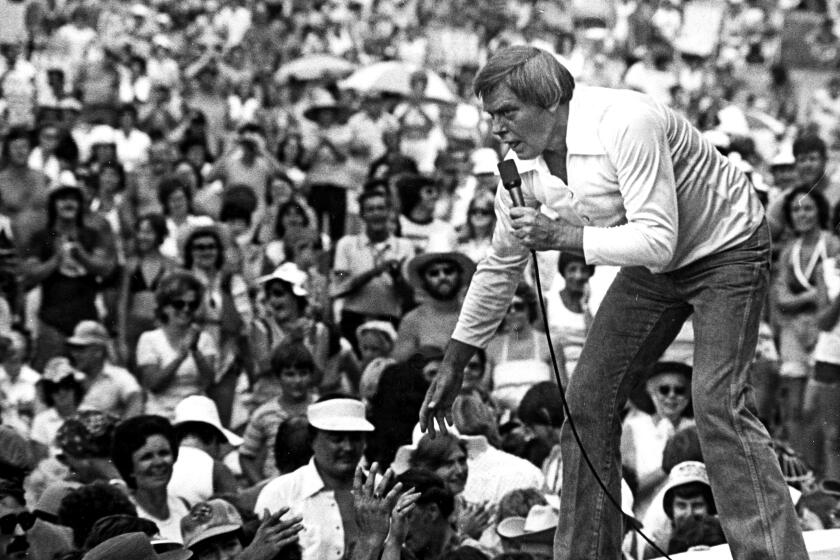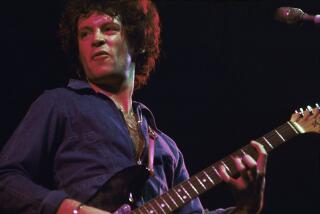Don Everly, of harmonizing rock ’n’ roll pioneers the Everly Brothers, dies at 84

Don Everly, the last surviving member of the Everly Brothers and a pioneer of rock ‘n’ roll, died at his home in Nashville on Saturday. He was 84.
A spokesperson for the family confirmed Everly’s death with The Times, but did not disclose a cause.
A statement from the family read in part: “Don lived by what he felt in his heart. Don expressed his appreciation for the ability to live his dreams ... with his soulmate and wife, Adela, and sharing the music that made him an Everly Brother.”
Don and his younger brother, Phil, were in the first group to be inaugurated in the Rock & Roll Hall of Fame in 1986, alongside Elvis Presley, Chuck Berry, Little Richard, Buddy Holly and Jerry Lee Lewis. Their family harmonies set them apart, as did an out-of-time gentleness: the Everly Brothers’ well-crafted songs floated between country and city and moved with the rhythms of a dream.
In a five-year span from 1957 to 1962, they had 15 top 10 hits, among them: “Bye Bye Love,” which launched them; “All I Have to Do Is Dream,” written by Boudleaux Bryant; and “Cathy’s Clown,” which was a No. 1 hit in 1960 and a No. 1 country hit for Reba McEntire in 1989.
Their harmonies influenced the Beatles and Simon & Garfunkel in the 1960s, and a decade later their Appalachian roots inspired country rockers such as Gram Parsons and Linda Ronstadt, who had a hit covering their “When Will I Be Loved” in 1975.

Isaac Donald Everly was born Feb. 1, 1937, and shared a first name with his formidable father, “Ike” Everly. Ike was a coal miner in Brownie, Ky., and Don was born in Brownie’s coal camp. Ike also was a guitar player, taught by Arnold Schultz, the Black musician who taught Bill Monroe. And when the coal was gone, Ike moved the family to Chicago in the late 1930s in search of a career in music.
A second son, Phil, was born there, and the family moved to Shenandoah, Iowa, where Ike had a radio show in the mid-1940s. “Little Donnie” sang the theme, “Free as a Little Bird as I Can Be,” and then Phil was brought in, and with that the Everly Family was on the air.
Tom T. Hall’s body of work reflects his era, when old-fashioned country values collided with the turbulent modern world of the 1960s and ‘70s.
The Everlys next moved to Knoxville, Tenn., in 1953; the teenage brothers were viewed as long-haired, leather-jacket-wearing toughs. Ike got a meeting for the boys with country music mogul Chet Atkins in Nashville, and Atkins was so impressed with Don’s songwriting that he placed one of his songs with Kitty Wells.
In 1955, the family moved to Nashville and the boys auditioned for labels as a brother act. A single they made went nowhere, and they then signed with Cadence and were given a tune to kick around written by two of the hottest songwriters in town, Felice and Boudleaux Bryant. “Bye Bye Love” topped the country chart and hit No. 2 on the pop chart and No. 5 on the rhythm and blues chart in 1957. Another Bryant number, “Wake Up Little Susie,” topped the pop charts in 1957. When Chuck Berry was asked what song he most wished he’d written, he declared it was “Susie.” “All I Have to Do Is Dream” followed in 1958.

Rock ‘n’ roll was in ascendance, but if the music was mostly about revolt and rule-breaking, here was a style that felt both pre-rock and yet of the moment, built on family harmony and gentle sadness that seemed innocent even then.
The music floated on the brothers’ harmonies, in effortless chromosomal alignment and held in place by the crisp playing of Nashville studio veterans.
The hits continued: “Devoted to You” and “Bird Dog” in 1958; “(Til’) I Kissed You,” written by Don, in 1959; and “Let It Be Me,” “Cathy’s Clown” and “When Will I Be Loved” in 1960. “Crying in the Rain” and then “That’s Old Fashioned (That’s the Way Love Should Be)” from 1962 were their final forays into the top 10.

As a songwriter, Don tapped into a strain of Appalachian gothic despair that was absorbed by audiences as teenage heartache. He was the dark brother, singing, “Turn the wheel and let it spin, tip the glass and see the bottom, can’t you see you’ll never win?” (1972’s “I’m Tired of Singing My Song in Las Vegas”). He once told a CNN interviewer, “I had this haunted feeling all my life, of being odd man out.”
His baritone voice carried the melody, and Phil had to constantly watch onstage so he would know when to come in. “It’s like playing tennis with someone who is really great,” explained Phil. “You can’t let your mind wander for even a microsecond, or you’ll be left behind.”
In 1959, Don married Sue Ingraham, his first of four wives, and the Everly Brothers moved from Nashville to Los Angeles. The years on the road were draining, and a visit to a doctor around 1961 introduced Don to a new treatment for exhaustion: Ritalin. For years, he was addicted to a stimulant cocktail. He attempted suicide in a London hotel room in the early 1960s, and received shock treatments as part of his recovery. He managed to get off stimulants just in time to find the hits were over.
“When Phil and I started out, everyone hated” rock ‘n’ roll, he told Rolling Stone’s Kurt Loder in 1986. “The record companies didn’t like it at all — felt it was an unnecessary evil. And the press: interviewers were always older than us, and they let you know they didn’t like your music, they were just doing the interview because it was their job. Then along came the Sixties, and everyone suddenly got real young, and if you were over thirty, they didn’t trust you.”
The Everlys kept touring, and Don led an interesting life on his own, hanging out with Bob Dylan and Jimi Hendrix, taking LSD and performing in tuxedos. There were forgettable albums of oldies and tributes to British rock (they remained quite popular in England). And then came their 1968 masterpiece, “Roots,” a sparkling record that looked at their past and was also a harbinger of the country-rock on the horizon.

All families have their ups and downs, and life on the road together fed tensions for the Everly Brothers; the act itself famously imploded at a show at Knott’s Berry Farm in July 1972. Don had given his brother two weeks’ notice that he was out; “I’m tired of being an Everly Brother,” he told a reporter.
Don moved back to Nashville and studied cooking, wine and photography. Both released solo records over a 10-year period during which they didn’t speak. Then in 1983, they reunited for a concert in London and a comeback album produced by Dave Edmunds, “EB84.” Along with songs by Jeff Lynne and Nick Lowe, the album featured the Paul McCartney-penned single “On the Wings of a Nightingale.”
It was a chance to pay back for what the Beatles had learned from the brothers: “When John and I first started to write songs,” McCartney has said of his partnership with John Lennon, “I was Phil and he was Don.”
In his later years, Don returned home to Kentucky, buying a country hotel in the area in which his family once lived. After a fire destroyed the hotel, he moved to Nashville, where he lived for years.
Phil Everly died in 2014. Don said he always thought he would be the one to go first.
Don Everly is survived by his mother, Margaret; his wife, Adela; his son, Edan; and his daughters Venetia, Stacy and Erin, ex-wife of Guns N’ Roses singer Axl Rose.
In 2019, Don was voted into the Musicians Hall of Fame in Nashville; in a video, Keith Richards called him “one of the best rhythm guitar players I’ve ever heard.”
More to Read
The biggest entertainment stories
Get our big stories about Hollywood, film, television, music, arts, culture and more right in your inbox as soon as they publish.
You may occasionally receive promotional content from the Los Angeles Times.






